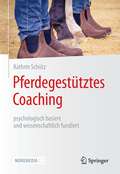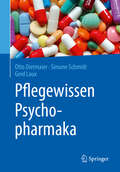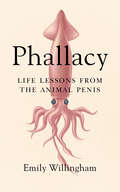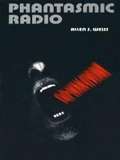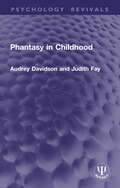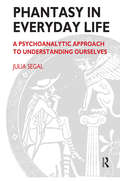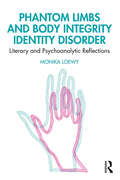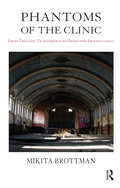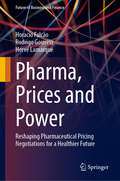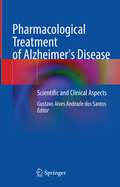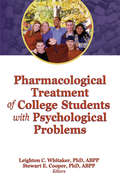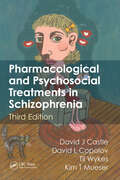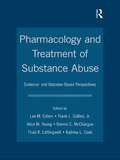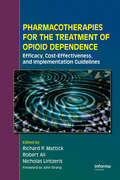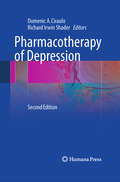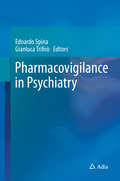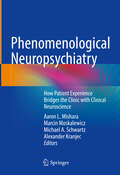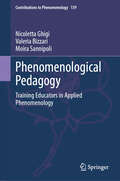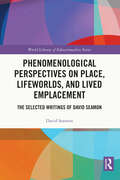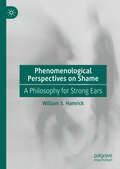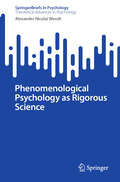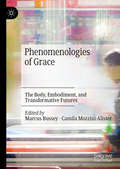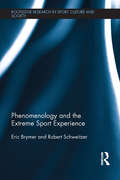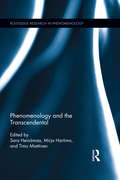- Table View
- List View
Pferdegestütztes Coaching – psychologisch basiert und wissenschaftlich fundiert
by Kathrin SchützIn diesem praxisrelevanten Buch erfahren Sie, warum das Coaching mit Pferden so wirkungsvoll ist und warum dabei Psychologie, Forschung und Praxis so wichtig sind. Sie erhalten Antworten auf die Frage, was hinter dieser Methode der Persönlichkeitsentwicklung steckt und wie verschiedene Coaching-Bausteine ressourcenorientiert zusammengefügt werden können. Ergänzt wird dies durch wissenschaftliche Studien, die das Pferdecoaching untermauern und auch Grenzen aufzeigen. Dazu lernen Sie, welche Anforderungen Coaches in Bezug auf Qualitätsstandards erfüllen sollten, um Klienten mit fundierten und nachhaltigen Intervention in ihrer Persönlichkeit zu stärken. Neben den psychologischen Erklärungen erhalten Sie zahlreiche Anwendungsbeispiele, so dass Sie die Form der pferdegestützten Arbeit direkt nachvollziehen können. Zur Veranschaulichung ist das Buch mit zahlreichen Abbildungen und Videoclips angereichert. Zielgruppen: (Pferdegestützte) Coaches, Klienten, die mehr über die Coaching-Variante erfahren möchten und Kritiker, die das Pferdecoaching für Ponys-im-Kreis-Führen halten. Dass das Coaching mit Pferden in professionellen Händen so viel mehr ist, zeigt das Buch facettenreich auf.Zur Autorin: Prof. Dr. Kathrin Schütz ist Professorin für Wirtschaftspsychologie, Ausbilderin, Coach und Forscherin für pferdegestützte Persönlichkeitsentwicklung mit über 10 Jahren Erfahrung sowie Expertin für Psychologie im Reitsport.
Pflegewissen Psychopharmaka
by Simone Schmidt Otto Dietmaier Gerd LauxMehr als nur Aufbewahren, Richten und Verabreichen: verantwortungsvoll Pflegen!Dieses Buch richtet sich an Pflegende im ambulanten und stationären Bereich und bietet wichtiges Fachwissen über Psychopharmaka. Welches sind die wesentlichen Merkmale der einzelnen Medikamentengruppen? Was sind die Wirkmechanismen, Neben- und Wechselwirkungen und wie geht man therapeutisch vor? Hier benötigen Pflegende eine gute Basiskompetenz, denn es bestehen viele Vorurteile und Halbwahrheiten gegenüber den am meisten verordneten Medikamenten. Kontinuierliche Krankenbeobachtung und eine frühzeitige Informationsweitergabe gehören ebenso zu der Verantwortung, wie das korrekte Aufbewahren, Richten und Verabreichen. Die einheitliche Struktur des Buches bietet eine gute Übersicht der unterschiedlichen Gruppen und pflegerischen Besonderheiten.
Phallacy: Life Lessons from the Animal Penis
by Emily WillinghamA wry look at what the astonishing world of animal penises can tell us about how we use our own.The fallacy sold to many of us is that the penis signals dominance and power. But this wry and penetrating book reveals that in fact nature did not shape the penis--or the human attached to it--to have the upper...hand. Phallacy looks closely at some of nature's more remarkable examples of penises and the many lessons to learn from them. In tracing how we ended up positioning our nondescript penis as a pulsing, awe-inspiring shaft of all masculinity and human dominance, Phallacy also shows what can we do to put that penis back where it belongs. Emphasizing our human capacities for impulse control, Phallacy ultimately challenges the toxic message that the penis makes the man and the man can't control himself. With instructive illustrations of unusual genitalia and tales of animal mating rituals that will make you particularly happy you are not a bedbug, Phallacy shows where humans fit on the continuum from fun to fatal phalli and why the human penis is an implement for intimacy, not intimidation.
Phantasmic Radio
by Allen S. WeissThe alienation of the self, the annihilation of the body, the fracturing, dispersal, and reconstruction of the disembodied voice: the themes of modernism, even of modern consciousness, occur as a matter of course in the phantasmic realm of radio. In this original work of cultural criticism, Allen S. Weiss explores the meaning of radio to the modern imagination. Weaving together cultural and technological history, aesthetic analysis, and epistemological reflection, his investigation reveals how radiophony transforms expression and, in doing so, calls into question assumptions about language and being, body and voice.Phantasmic Radio presents a new perspective on the avant-garde radio experiments of Antonin Artaud and John Cage, and brings to light fascinating, lesser-known work by, among others, Valère Novarina, Gregory Whitehead, and Christof Migone. Weiss shows how Artaud's "body without organs" establishes the closure of the flesh after the death of God; how Cage's "imaginary landscapes" proffer the indissociability of techne and psyche; how Novarina reinvents the body through the word in his "theater of the ears." Going beyond the art historical context of these experiments, Weiss describes how, with their emphasis on montage and networks of transmission, they marked out the coordinates of modernism and prefigured what we now recognize as the postmodern.
Phantasy in Childhood (Psychology Revivals)
by Audrey Davidson Judith FayFirst published in 1952, Phantasy in Childhood is for a psycho-analytically oriented public. The authors have set out to express in non-technical language some of the theories we owe to the work of Melanie Klein, and to show how they are repeatedly borne out in the day-to-day behaviour of children. Numerous practical examples are given, drawn from experience of children under many different conditions. In some cases the authors merely suggest interpretations which seem likely, but would need psychoanalytic confirmation; in others the meaning is unmistakable from the material available; in all, the aim has been to point to the presence and nature of unconscious phantasy, and to its expression in behaviour. Although written in simple language, the book is not easy, as, to those who are unfamiliar with it, the concept of unconscious phantasy is in itself difficult. The attempt has been made, however, to give living pictures of the children, and, while definitely not advocating the wild application of a psycho-analytic technique, to show how some understanding of the importance of phantasy can be of value to those caring for children.This book is a re-issue originally published in 1952. The language used is a reflection of its era and no offence is meant by the Publishers to any reader by this re-publication.
Phantasy in Everyday Life: A Psychoanalytic Approach to Understanding Ourselves (Pelican Ser.)
by Julia SegalOver the past fifty years dramatic ideas and discoveries have arisen out of the work of analysts. In Phantasy in Everyday Life the author is mainly concerned with Melanie Klein's contribution to the field and with everyday application of her theories. Central to the author's theme is Melanie Klein's concept of phantasy - the unconscious fantasies which control our assumptions, our thoughts, our emotions and our behavior. The first half of the book is concerned with daily life; the second more with theoretical issues. Written from her direct experience,the author's work will prove invaluable both to professionals and to the wider general public.
Phantom Limbs and Body Integrity Identity Disorder: Literary and Psychoanalytic Reflections
by Monika LoewyPhantom Limbs and Body Integrity Identity Disorder discusses the conditions of Phantom Limb Syndrome and Body Integrity Identity Disorder together for the first time, exploring examples from literature, film, and psychoanalysis to re-ground theories of the body in material experience. The book outlines the ways in which PLS and BIID involve a feeling of rupture underlined by a desire for wholeness, using the metaphor of the mirror-box (a therapeutic device that alleviates phantom limb pain) to examine how fiction is fundamentally linked to our physical and psychical realities. Using diverse examples from theoretical and fictional works, including thinkers such as Sigmund Freud, Jacques Lacan, Maurice Blanchot, D.W. Winnicott, and Georges Perec, and films by Powell and Pressburger and Quentin Tarantino, each chapter offers a detailed exploration of the mind/body relationship and experiences of fragmentation, bodily ownership, and symbolic reconstitution. By tracing these concepts, the monograph demonstrates ways in which fiction can enable us to understand the psychosomatic conditions of PLS and BIID more thoroughly, while providing new ways of reading psychoanalysis, literary theory, and fictional works. The first book to analyse BIID in relation to PLS, Phantom Limbs and Body Integrity Identity Disorder will be essential reading for academics and literary readers interested in the body, psychoanalysis, English literature, literary theory, film, and disability.
Phantoms of the Clinic: From Thought-Transference to Projective Identification
by Mikita BrottmanAs Freud predicted, there has always been great anxiety about the place of psychoanalysis in contemporary life, particularly in relation to its ambiguous and complicated relationship to the realm of science. There is also a long history of widespread resistance, in both academia and medicine, to anything associated with the world of the supernatural; very few people, in their professional lives, at least, are willing to admit a serious interest in occult phenomena. As a result, paranormal traces have all but vanished from the psychoanalytic process - though not without leaving a residue. This residue remains, the author argues, in the acceptably "clinical" guise of projective identification, a concept first formulated by Melanie Klein, and widely used in contemporary psychoanalysis to suggest a different variety of transference and transference-like phenomena between patient and analyst that seem to occur outside the normal range of the sensory process.
Pharma, Prices and Power: Reshaping Pharmaceutical Pricing Negotiations for a Healthier Future (Future of Business and Finance)
by Horacio Falcão Rodrigo Gouveia Hervé LamarqueThis book brings a negotiation perspective to healthcare. It opens the hidden box of pricing and reimbursement (P&R) negotiations, showing their huge impact on global healthcare systems and how they could be drastically improved. The authors offer a comprehensive and unique negotiation-based analysis of healthcare systems worldwide, highlighting the historical, structural, and ethical challenges that shape P&R negotiations. From the role of governments and health insurers to the intricate dynamics between healthcare providers and users, the authors examine the forces driving healthcare costs and access. With a unique blend of theoretical expertise and practical experience, the authors propose a paradigm shift toward value-oriented negotiations. They show how to move away from adversarial win-lose tactics to collaborative and transparent negotiations.
Pharmacological Treatment of Alzheimer's Disease: Scientific and Clinical Aspects
by Gustavo Alves Andrade dos SantosAlzheimer’s disease is the most prevalent form of dementia. Although it was discovered about a century ago, the first drugs applied in treatment were only introduced in therapy in the last 30 years.This book focuses on the clinical pharmacology of drugs that aim to delay the progression of Alzheimer’s disease, such as anticholinesterases and glutamate receptor antagonists, as well as treatment for the behavioral changes caused by the progression of the disease: antidepressants, antipsychotics, anxiolytics, and mood stabilizers.In addition, it describes important information about the pathophysiology and diagnostic methods of Alzheimer’s disease, emergency situations conditioned by the dementia process, and presents new perspectives for the treatment of Alzheimer’s disease. The ten chapters cover topics such as mechanism of action, dosage regimen, adverse reactions, drug interactions, toxicity profiles, among other information of clinical relevance. The work comprises evidence-based studies, providing a valuable resource for analyzing, prescribing and monitoring patients being treated for Alzheimer’s disease.Written by experts with solid professional experience, this book will appeal to pharmacologists, geriatricians, neurologists, psychiatrists, biomedical clinicians, and other healthcare professionals.
Pharmacological Treatment of College Students with Psychological Problems
by Leighton C. Whitaker Stewart E. CooperGet valuable insights into best practices and procedures for treatment Mental health practitioners across the country are increasingly treating students by combining the use of psychotropic medication with psychotherapy. Pharmacological Treatment of College Students with Psychological Problems explores in detail this uncritically accepted exponential expansion of the practice. Leading psychiatrists, psychologists, and social workers discuss the crucial questions and problems encountered in this widespread practice, and also present specific and differing models of combined therapy. This book critically examines several of the key issues, practices, and competing perspectives. Professionals working in college mental health are provided with valuable insights into best practices and procedures in split and integrated treatment. Various clinicians beyond the psychiatric field are prescribing psychotropic medications with increasing frequency. Pharmacological Treatment of College Students with Psychological Problems presents a wide range of viewpoints on this issue, offering evidence, arguments, and recommendations to clearly illustrate the need for increased attention to the use of psychotropic medications and show how psychotherapy may be safer and more beneficial. Chapters include discussions on withdrawing from medication successfully, long term perturbation effects, and differing models of combined therapy in practice. This resource is comprehensively referenced. Topics in Pharmacological Treatment of College Students with Psychological Problems include: identification of the key issues and practices of combining psychotropic medication with counseling in treatment elements of two separate university counseling centers and how they provide combined treatment emerging research on perturbation effects of use of psychotropic medications best practices in the combined treatment in college settings key unresolved questions that need further research bringing a more sophisticated level in the practice of combined treatment with college students Pharmacological Treatment of College Students with Psychological Problems is a valuable resource for all professionals from seasoned professionals to beginning practicum students.
Pharmacological and Psychosocial Treatments in Schizophrenia
by David J. Castle Kim T. Mueser Til Wykes David L. CopolovPharmacological and Psychosocial Treatments in Schizophrenia provides a succinct clinical overview of key areas pertinent to the holistic treatment of people with schizophrenia and, in particular, puts firmly back onto the agenda the importance of psychosocial treatments.The latest data concerning the newer antipsychotic agents and clinical guidelines for their use are reviewed. The real emphasis, however, is on the psychosocial interventions for specific aspects of schizophrenia symptomatology and disability that have been shown to offer major benefits to recovery in the disorder, and yet have failed to have a high profile in the literature, as more effective biological treatments have become available.This book offers practical guidance on effective strategies for use in both clinical settings and in the family context, placing the patient (and their family) once again at the centre of therapeutic endeavours. Encouraging professionals to offer a broader therapeutic approach, this book will offer real hope to therapists, patients and families of what can be achieved if psychosocial interventions complement the many psychopharmacological treatments available today.Key topics include: female patients, treatment resistance, the substance abuser patient, family intervention, helping the patient at work, managing violent behaviour, first episode psychosis and rating scales in schizophrenia.
Pharmacology and Treatment of Substance Abuse: Evidence and Outcome Based Perspectives (Counseling and Psychotherapy)
by Jr. Lee M. Cohen Frank L. Collins Alice M. Young Dennis E. McChargue Thad R. Leffingwell Katrina L. CookGiven the prevalence of substance abuse in general clinical populations, it is important for healthcare providers to have knowledge and skill in the treatment of these problems. Evidence-Based Practice (EBP) involves the integration of the best evidence with clinical expertise and patient values. This text is designed as a bridge for practitioners that will provide up-to-date evidence reviews as well as information on how to best keep up with emerging trends in the field. The editors have gathered expert authors to provide a much needed summary of the current status of the evidence based practice for both the assessment and treatment of specific substance use disorders.
Pharmacotherapies for the Treatment of Opioid Dependence: Efficacy, Cost-Effectiveness and Implementation Guidelines
by Richard P. Mattick Robert Ali Nicholas LintzerisThe most comprehensive text of its kind, this book addresses both the management of opioid withdrawal and opioid maintenance therapy, and combines up-to-date reviews of the scientific literature with evidence-based clinical guidelines for all of the relevant pharmacotherapies. A unique work, Pharmacotherapies for the Treatment of Opioid Dependence
Pharmacotherapy of Depression
by Richard Irwin Shader Domenic A. CirauloComprehensive and state of the art, the second edition of Pharmacotherapy of Depression offers major revisions of every chapter and the addition of new chapters by expert contributors. The first chapter reviews the neurobiology of depression, which lays the groundwork for understanding the mechanisms of action of antidepressants. In the next chapter, a review of the general principles guiding the diagnosis and medication treatment of unipolar depression is provided. The clinical pharmacology of antidepressants is reviewed in some detail, supplemented by tables that provide information on dosing, indications, and metabolism. Augmentation strategies are reviewed, including the use of non-traditional agents. The chapters that follow next address the use of antidepressants in special populations, such as the elderly and depressed individuals with psychosis, bipolar disorder, substance abuse, and post traumatic stress disorder. The complex issues involving the diagnosis and treatment of depression during pregnancy is thoroughly reviewed in Chapter 8 and provides a synthesis of the scientific literature in the area, one that is noted for contradictory and controversial findings, as well as guidelines for prescribing. The next chapter then provides an overview of the treatment of depression in the pediatric population, highlighting clinical concerns such as suicide risk. The book concludes with two chapters at the interface of medicine and psychiatry in the treatment of mood disorders: managing depression in primary care settings and depression associated with medical illnesses. The outstanding clinician-scientists who have contributed to this volume are all leaders in their fields and represent a broad spectrum of renowned institutions. A timely contribution to the literature, The Pharmacotherapy of Depression, Second Edition, offers busy clinicians from many disciplines a strong scientific foundation that seamlessly transitions into practical recommendations for clinical practice. The result is another gold-standard guide to the safe and effective use of the latest antidepressant medications.
Pharmacovigilance in Psychiatry
by Edoardo Spina Gianluca TrifiròThe first authoritative textbook specifically addressing issues of the field, this book delivers a focused discussion on several themes in psychiatry while providing a sound background on pharmacovigilance. Internationally-recognised researchers, clinicians and pharmacovigilance experts contributed to this textbook, giving it the benefit of different perspectives and years of experience. Pharmacovigilance in psychiatry provides a thorough introduction to this field but goes on to explore advanced themes such as methodologies and resources used for pharmacovigilance in psychiatry, challenges as well as most recent developments to this field, making it suitable for under-graduates, graduate and post-doctoral students and persons working pharmacovigilance who seek to broaden their knowledge on this subject.
Phase Theory
by Barbara CitkoPhase Theory is the latest empirical and conceptual innovation in syntactic theory within the Chomskyan generative tradition. Adopting a cross-linguistic perspective, this book provides an introduction to Phase Theory, tracing the development of phases in minimalist syntax. It reviews both empirical and theoretical arguments in favor of phases, and examines the role phases play at the interface with semantics and phonology. Analyzing current phasehood diagnostics, it applies them in a systematic fashion to a broad range of syntactic categories, both phases and non-phases. It concludes with a discussion of some of the more contentious issues in Phase Theory, involving cross-linguistic variation with respect to phasehood and the dynamic versus static nature of phases.
Phenomenological Neuropsychiatry: How Patient Experience Bridges the Clinic with Clinical Neuroscience
by Marcin Moskalewicz Michael A. Schwartz Aaron L. Mishara Alexander KranjecThis innovative book offers a multidimensional exploration of the epistemological foundations of psychiatry and its major disorders. By emphasizing the importance of phenomenology in unravelling the intricate interplay between basic categories of human experience and neurobiological processes, it advocates for a shift in both psychiatric research and clinical practice. Phenomenological Neuropsychiatry presents psychiatry as a hybrid discipline that synthesizes subjective mental experiences with objective neuroscientific findings and forms an integrative and interdisciplinary structure that provides a dialectical bridge between understanding, compassion, and explanation. The first section of the book presents the lived experience of psychosis and argues for a more inclusive approach to mental health issues. The second section examines the ways in which psychiatric knowledge is constructed and the unique challenges posed by combining understanding and explanation of mental disorders. Section three sheds light on how disruptions in bodily experiences, memory processes, and self-perception can contribute to the development and manifestation of psychiatric issues. The following section discusses disorders of mood and anxiety, including the phenomena of depression, obsessions, and depersonalization. The fifth and final section provides an in-depth examination of psychotic disorders. It covers a range of topics, such as timing, intentionality, self-monitoring of action in schizophrenia, and the neurobiology of prodromal psychosis. As a singular work dedicated to revitalizing and advancing cross-fertilization between psychiatry and phenomenology, this groundbreaking book clears the foggy operationalized clusters of mental symptoms that may obscure diagnosis and treatment and argues for systematic integration of patient subjectivity and collaboration in clinical research. It features an authorship of the leading clinicians and thinkers from throughout the world in psychiatry, psychology, neuroscience, social sciences, and philosophy. Phenomenological Neuropsychiatry: How Patient Experience Bridges the Clinic with Clinical Neuroscience is a major contribution to the clinical literature and a must-read for psychiatrists, neurologists, psychologists, and professionals and students from other disciplines concerned with absorbing a deeper understanding of psychiatric disorders.
Phenomenological Pedagogy: Training Educators in Applied Phenomenology (Contributions to Phenomenology #139)
by Valeria Bizzari Nicoletta Ghigi Moira SannipoliThis volume covers the application of phenomenology not only to psychology and psychiatry but precisely to pedagogy and the training of educators. It fills a gap in offering a unique resource which combines both theory and practice. Through an interdisciplinary means, this book provides new theories and applications of phenomenological pedagogy at all levels of education and with a unique focus on autism and special educational needs. It proposes a shift in the paradigm and treatment: from a neuro-cognitivist approach at the present core of most pedagogical theories to a phenomenological and enactivist perspective on subjectivity. It appeals to students, researchers, and practitioners working in phenomenology, psychology and education.
Phenomenological Perspectives on Place, Lifeworlds and Lived Emplacement: The Selected Writings of David Seamon
by David SeamonPhenomenological Perspectives on Place, Lifeworlds and Lived Emplacement is a compilation of seventeen previously published articles and chapters by David Seamon, one of the foremost researchers in environmental, architectural, and place phenomenology. These entries discuss such topics as body-subject, the lived body, place ballets, environmental serendipity, homeworlds, and the pedagogy of place and placemaking. The volume's chapters are broken into three parts. Part I includes four entries that consider what phenomenology offers studies of place and placemaking. These chapters illustrate the theoretical and practical value of phenomenological concepts like lifeworld, natural attitude, and bodily actions in place. Part II incorporates five chapters that aim to understand place and lived emplacement phenomenologically. Topics covered include environmental situatedness, architectural phenomenology, environmental serendipity, and the value of phenomenology for a pedagogy of place and placemaking. Part III presents a number of explications of real-world places and place experience, drawing on examples from photography (André Kertész’s Meudon), television (Alan Ball’s Six Feet Under), film (John Sayles’ Limbo and Sunshine State), and imaginative literature (Doris Lessing’s The Four-Gated City and Louis Bromfield’s The World We Live in). Seamon is a major figure in environment-behavior research, particularly as that work has applied value for design professionals. This volume will be of interest to geographers, environmental psychologists, architects, planners, policymakers, and other researchers and practitioners concerned with place, place experience, place meaning, and place making.
Phenomenological Perspectives on Shame: A Philosophy for Strong Ears
by William S. HamrickThis book utilizes Maurice Merleau-Ponty’s fascinating philosophy of embodiment to cast further light on the incredibly rich and complex phenomenon of shame. The philosopher himself made only scattered references to shame, but both his early phenomenology and his later phenomenological ontology do provide unique illumination of the phenomenon. The book demonstrates how Merleau-Ponty’s work is relevant to those of certain other thinkers in the analytic tradition.
Phenomenological Psychology as Rigorous Science (SpringerBriefs in Psychology)
by Alexander Nicolai WendtExperimental psychology depends on theoretical and methodological foundations. Addressing these foundations is not always trivial and requires a shift in epistemological perspective. Phenomenology can provide a framework that helps to discuss the possibilities and challenges of the discipline. This book provides a historical overview of the phenomenological movement as well as a systematic introduction to the research approaches that are known as ‘phenomenological psychology’. The central claim is that the phenomenological discourse can increase the conceptual, descriptive, and methodological rigor in psychology. The purpose of the book is to facilitate the dialogue between phenomenology and cognitive sciences. It is meant to be a guide for interested scholars but also offers new ideas for experts in the field.
Phenomenologies of Grace: The Body, Embodiment, and Transformative Futures
by Marcus Bussey Camila Mozzini-AlisterThis book explores the place of the body and embodied practices in the production and experience of grace in order to generate transformative futures. The authors offer a range of phenomenologies in order to move the philosophical anchoring of phenomenology from an abstracted European tradition into more open and complex experiential sets of understandings. Grace is a sticky word with many layers to it, and the authors explore this complexity through a range of traditions, practices, and autobiographical accounts. The goal is to open a grace-space for reflection and action that is both futures-oriented and enlivening.
Phenomenology and the Extreme Sport Experience (Routledge Research in Sport, Culture and Society)
by Eric Brymer Robert SchweitzerUnderstanding the motivations behind those who partake in extreme sports can be difficult for some. If the popular conception holds that the incentive behind extreme sports participation is entirely to do with risking one’s life, then this confusion will continue to exist. However, an in-depth examination of the phenomenology of the extreme sport experience yields a much more complex picture. This book revisits the definition of extreme sports as those activities where a mismanaged mistake or accident would most likely result in death. Extreme sports are not necessarily synonymous with risk and participation may not be about risk-taking. Participants report deep inner transformations that influence world views and meaningfulness, feelings of coming home and authentic integration as well as a freedom beyond the everyday. Phenomenologically, these experiences have been interpreted as transcendent of time, other, space and body. Extreme sport participation therefore points to a more potent, life-enhancing endeavour worthy of further investigation. This book adopts a broad hermeneutic phenomenological approach to critique the assumed relationship to risk-taking, the death wish and the concept of "No Fear" in extreme sports, and repositions the experience in a previously unexplored manner. This is valuable reading for students and academics interested in Sports Psychology, Social Psychology, Health Psychology, Tourism, Leisure Studies and the practical applications of phenomenology.
Phenomenology and the Transcendental (Routledge Research in Phenomenology)
by Mirja Hartimo Sara Heinämaa Timo MiettinenThe aim of this volume is to offer an updated account of the transcendental character of phenomenology. The main question concerns the sense and relevance of transcendental philosophy today: What can such philosophy contribute to contemporary inquiries and debates after the many reasoned attacks against its idealistic, aprioristic, absolutist and universalistic tendencies—voiced most vigorously by late 20th century postmodern thinkers—as well as attacks against its apparently circular arguments and suspicious metaphysics launched by many analytic philosophers? Contributors also aim to clarify the relations of transcendental phenomenology to other post-Kantian philosophies, most importantly to pragmatism and Wittgenstein’s philosophical investigations. Finally, the volume offers a set of reflections on the meaning of post-transcendental phenomenology.
